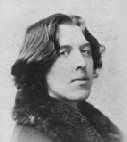|
 Oscar O'Flahertie Fingal Wills Wilde, born in Dublin, Ireland on October 16, 1854, was the second son of Sir William and Lady Jane Wilde. Sir William was a renowned surgeon who found himself embroiled in a sensational scandal in 1864 when Mary Travers, a former patient, informed a local newspaper that she had been chloroformed and raped. Lady Jane was a poet who stood six feet tall and claimed to be "above respectability." She loved to make a sensation and passed this passion on to her youngest son. Oscar O'Flahertie Fingal Wills Wilde, born in Dublin, Ireland on October 16, 1854, was the second son of Sir William and Lady Jane Wilde. Sir William was a renowned surgeon who found himself embroiled in a sensational scandal in 1864 when Mary Travers, a former patient, informed a local newspaper that she had been chloroformed and raped. Lady Jane was a poet who stood six feet tall and claimed to be "above respectability." She loved to make a sensation and passed this passion on to her youngest son.
In 1878, Oscar Wilde moved to London with a degree from Oxford and a burning desire to achieve stardom. He had been taught by his mother to view life as a performance, and he made a spectacle of everything, sometimes hailing a cab just to cross the street. He once wrote, "I awoke the imagination of my century so that it created myth and legend around me." His wardrobe was designed not by tailors, but by theatre costumiers who Wilde felt would more easily understand the dramatic effects he was trying to achieve. His standard costume included a velvet coat edged with braid, knee breeches, black silk stockings, a soft loose shirt with wide low turned-down collar, and a large flowing pale green tie. He topped the costume off with sunflowers and lillies in his buttonhole, a garish touch which became almost a signature for the outrageous public figure Wilde was so shrewdly constructing. Within two years, he had made quite a name for himself, but his first play, Vera or The Nihilists, was not well received. Nor was his first volume of poetry.
Wilde decided briefly to adopt a life of Victorian respectability. In 1884, he married Constance Lloyd and fathered two sons, Cyril (1885) and Vyvyan (1886). He even became editor of Women's World, a very reputable publication. But respectability was a terrible burden for Wilde, and by 1886 he was sneaking off to Oxford to visit young men. Shortly thereafter, he separated from his wife--claiming that he'd been away from home for so long that he'd forgotten the house number--and cut off ties with most of his family and intellectual peers. He submerged himself in a disorienting sea of liquor and young men and set out with his writing to "disturb the monotony of type, slavery of custom, tyranny of habit and reduction of man to the level of machine." Ironically, it was during this devil-may-care period (1888-1895) that most of Wilde's important works were written.
The last of Wilde's plays to be written, The Importance of Being Earnest (1895), is considered by many to be the finest modern farce in the English language. Unfortunately, by the time of it's premiere on February 14, 1895, Wilde's demise had already been set in motion. For months, the Marquess of Queensbury had been demanding that Wilde stay away from his son, Lord Alfred Douglas. Wilde, however, was quite infatuated with the young man and ignored the Marquess' urgings. Furious, Queensbury intended to publicly denounce Wilde at the opening of The Importance of Being Earnest, but he was refused a ticket. Two weeks later, he confronted Wilde at his club, leaving his infamously mispelled note accusing Wilde of "posing as a Somdomite." Wilde decided to charge Queensbury with libel, but revelations during the trial about the nature of Wilde's relationship with Queensbury's son caused the playwright to be prosecuted for offences to minors. He was tried twice. The first trial ended with a hung jury, the second with a guilty verdict. By May of 1895, Wilde was in jail serving two years hard labor.
Wilde made a few half-hearted attempts at literary activity after his imprisonment, but he concluded in the end that such endeavors were for "the other self--the man I once was." He was never the same after his release from prison in 1897. The once flamboyant public figure shyed away from his former audience, choosing to live the remainder of his life under the alias of Sebastian Melmoth. In 1900, Oscar Wilde died penniless and alone in a Paris hotel. He was buried without much ceremony in the cemetery of Père Lachaise. His other plays include Lady Windermere's Fan (1892), Salomé (1893), A Woman of No Importance (1893), and An Ideal Husband (1895).
|